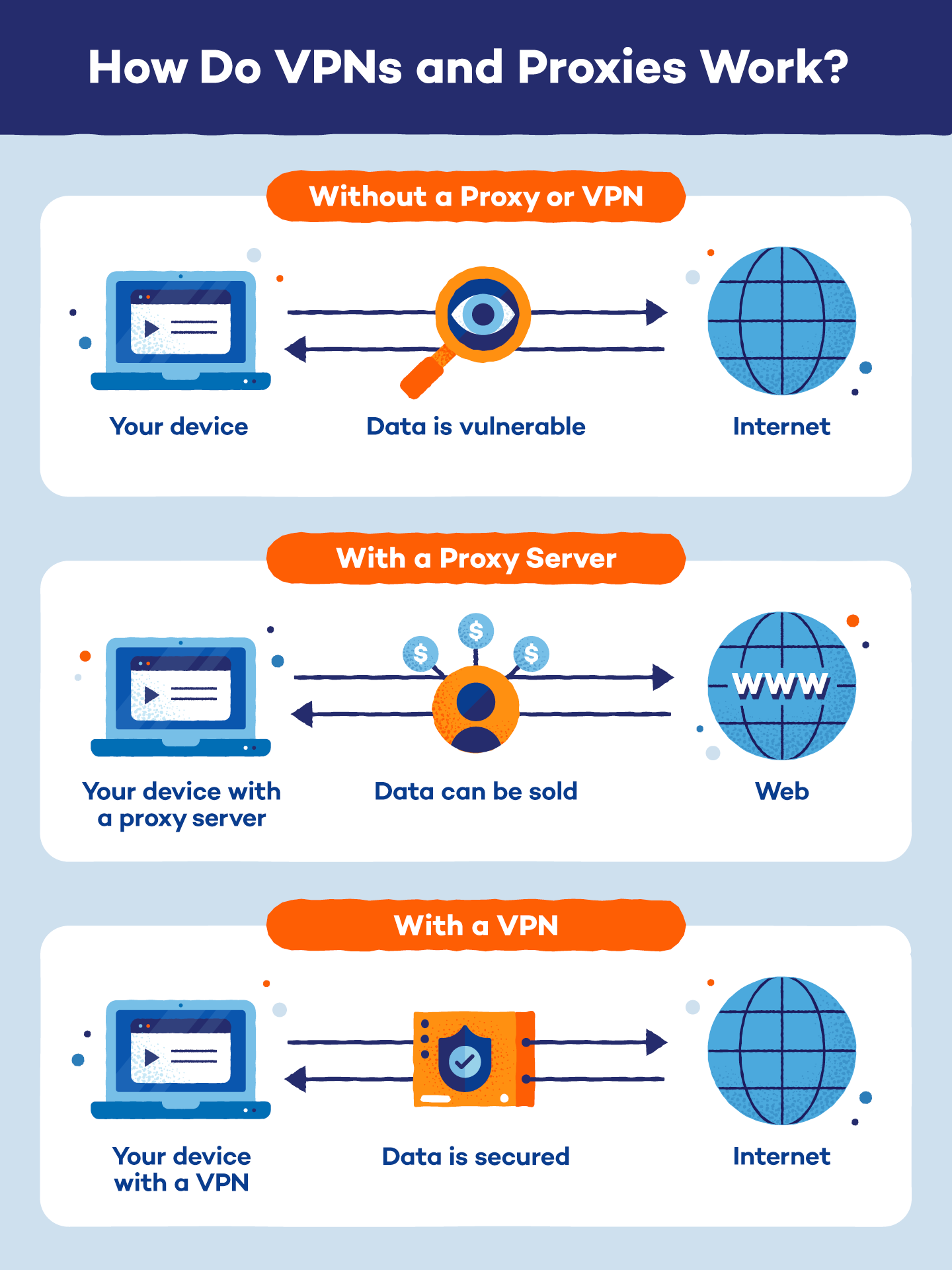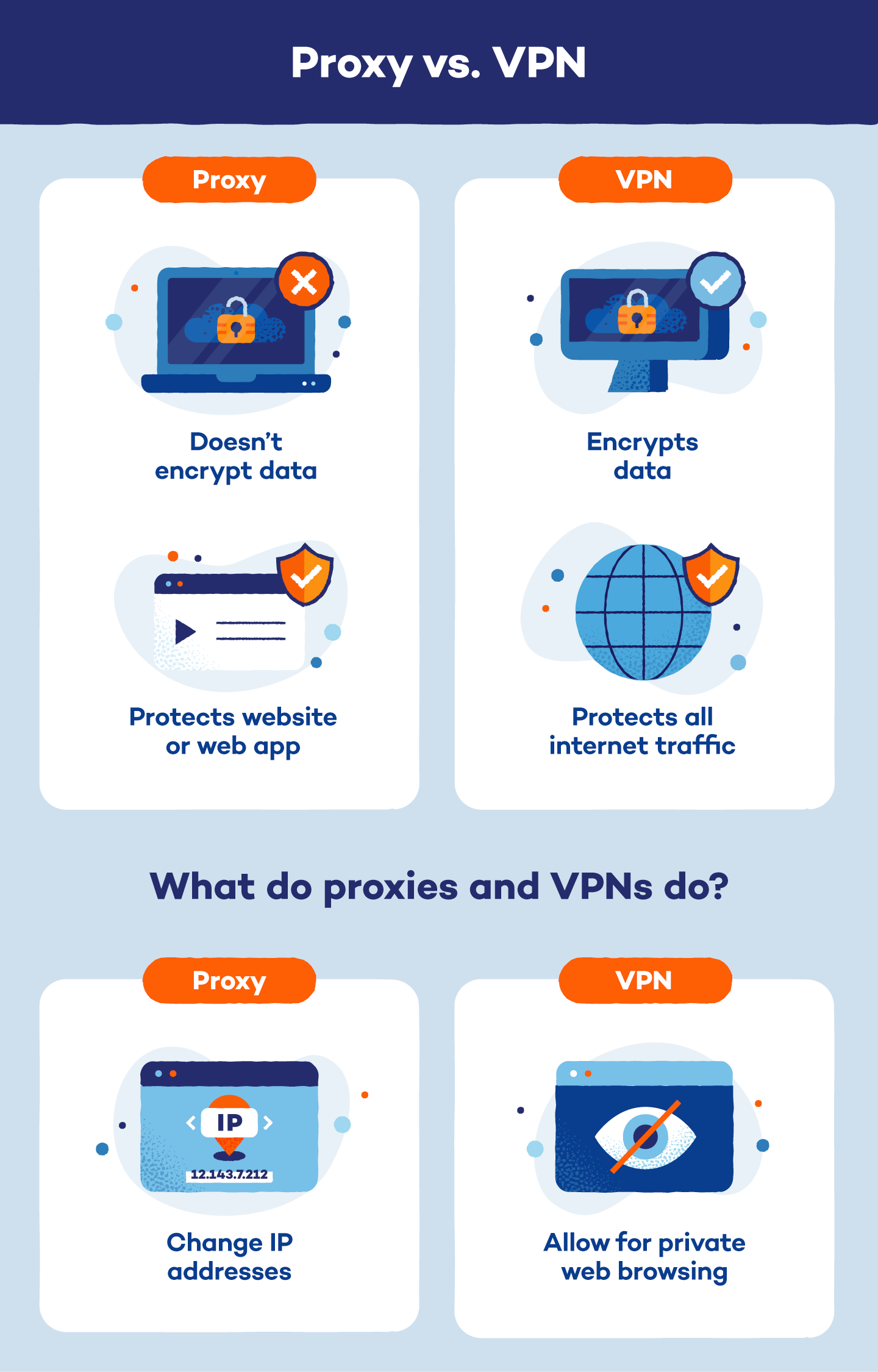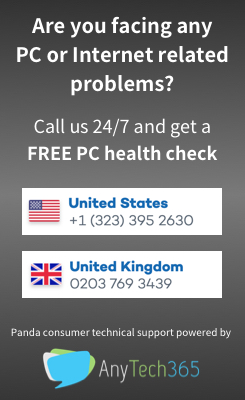Did you know that nearly 88% of Americans are aware of private networks? If you’re part of this statistic, then you’re probably trying to decide what type of online security to use.
Proxies and VPNs can both be used to hide your IP address and help you access online content securely. However, both offer different benefits that may sway you to pick one over the other.
Keep reading to learn about the differences between a proxy vs. VPN and which one could be best for your online security needs.
What Is a Proxy?
Normally when you browse the web, your computer connects to a website directly and begins downloading the pages for you to read. This process is simple and direct.
With a proxy, your computer sends all web traffic to the proxy first. The proxy server sends the request to the target website, downloads the relevant information and then passes it back to you.
Why would you choose to use a proxy server? There are a couple of reasons:
- You want to safely browse a website anonymously: All traffic appears to come from the proxy server, not your computer.
- You need to bypass a content restriction: For example, your U.K. Netflix subscription won’t work in the U.S. But if you connect to a U.K. proxy server, it looks like you are watching TV from the U.K. and everything works as expected.
Although they work very well, there are also a few problems with proxies:
- All of the web traffic that passes through a proxy can be seen by the server owner.
- Web traffic between your computer and a proxy, and a proxy and a website is unencrypted, so a skilled hacker can intercept sensitive data in transit and steal it.
There are three main types of proxy servers:
Transparent Proxies
These proxies are exactly what their name suggests — they’re completely invisible to the user. Transparent proxies can be set up by parents, employers and school administrators to block users from accessing certain websites and apps on the internet.
SOCKS5 Proxies
These proxies can be used not just for web pages, but for online games, file sharing and video streaming. However, SOCKS5 proxies tend to make your internet slower because of the number of people that are using them simultaneously.
HTTP Proxies
These proxies are used for web pages. HTTP proxies can also be used to access geographically restricted content, like a movie that’s unavailable for viewing in your country. By using a proxy server to access the website hosting the video, you can conceal the fact that your IP address is blocked from viewing it. Remember that doing this can be against your content provider’s user agreement.
Now that we understand how proxies work a bit better, let’s jump into what a virtual private network, or VPN, is.
What Is a VPN?
A VPN is quite similar to a proxy. Your computer is configured to connect to another server, and it may be that you route web traffic through that server. But there is one significant advantage of the VPN: All traffic is encrypted. This means hackers can’t access data between your computer and the VPN server, so your sensitive data can’t be compromised.

5 Differences Between a Proxy and a VPN
Although proxy servers and VPNs do have some similarities, they also have significant differences that are important to consider when deciding between the two.
| Feature | Proxy | VPN |
|---|---|---|
| Coverage | Coverage of 1 app or website | Coverage of all apps and websites |
| Number of uses | 1 | Unlimited |
| Encrypts IP address | Yes | Yes |
| Encrypts web traffic | No | Yes |
| Bypasses geo restrictions | Yes | Yes |
| Sells traffic data | Yes | No |
1. VPNs Encrypt Your Information While Proxy Servers Don’t
A key difference between VPNs and proxy servers is that VPNs can encrypt all of your browsing and internet data, whereas proxy servers don’t. This means hackers, businesses or government surveillance can’t gain access to your internet activity. For example, if you’re logging in to your bank or credit card accounts on a VPN, hackers can’t access your account numbers.
2. Proxy Connections Can Be Slower Than VPNs
Proxy servers can be slower than VPNs due to the number of users accessing the server. However, VPNs can also slow down your internet speed while it encrypts your internet data. If you’re using either, you’ll probably need to assume your internet speed will be slower than usual.
3. VPNs Reroute Traffic Through the Server
While most proxies only reroute the traffic of a single program or browser because they operate at the application level, VPNs reroute all of your traffic through a VPN server since they perform at the operating system level.
4. A VPN May Cost More Than a Proxy Server
Some VPNs are free of cost. However, VPN providers that charge a subscription fee can offer higher internet privacy and better security performance. Proxy servers are typically free, but it does come with a cost — your data is free to be used and sold to third-party advertisers.
5. VPN Connections Tend to Be More Reliable
Because VPNs are a paid service, VPN connections tend to be more reliable than proxy servers. With many users and a lack of infrastructure or support, proxy server connections can drop more frequently.
Which Server Should You Choose?

Now it’s time to decide which server is better for you: proxy or VPN. We’ve rounded up all the advantages and disadvantages of each one below.
Why you should choose a VPN:
- Faster speed: Although speed may vary depending on the network, VPNs are generally faster than proxy servers.
- Web traffic encryption: VPNs are the best choice if you want all of your internet traffic encrypted, not just your IP address.
- Full coverage: VPNs are able to cover multiple web apps and websites, not just one.
- No traffic logging: VPNs don’t log or sell your internet traffic to third parties.
Why you shouldn’t choose a VPN:
- Requires payment: Most VPNs, like Panda Security, offer a free trial for a limited time. However, a good VPN will require a paid subscription for use.
- Only worth it if you use it often: If you don’t plan to use your VPN every day, it’s probably better to just use a proxy server for when you need one-time protection.
Why you should choose a proxy server:
- No payment required: You don’t need to pay a subscription fee for a proxy server.
- Coverage for one website: If you need a single web app or website’s IP address hidden, then it’s better to use a proxy server versus a VPN.
Why you shouldn’t choose a proxy server:
- Only covers one web app or website: Proxy servers don’t offer full coverage of all websites and apps. If this is important to you, then it’s better to go with a VPN that offers full coverage.
- Logs internet traffic: Because you don’t have to pay to use a proxy server, they’re free to log all web traffic and potentially sell it to third parties for advertising purposes.
- Doesn’t encrypt all web traffic: Proxy servers can only hide a single IP address. Therefore, any other web traffic can still be seen by potential hackers or your internet provider.
If you’re looking for a security solution for one-time use and don’t care as much about who sees your internet activity, a proxy server is likely your best choice. However, if you’re looking for a foolproof protection service that will keep all your traffic hidden, a VPN is your best choice.
FAQ
We’ve compiled answers to frequently asked questions about how VPNs and proxies work and compare.
Is a VPN Better Than a Proxy?
A VPN is better than a proxy server for several reasons. VPNs encrypt all of your internet traffic, while a proxy server only encrypts the IP address of one web app or website. Another advantage of paid VPNs is that your data can’t be sold to third parties for advertising purposes, whereas with a free proxy server, there’s a high chance your traffic data will be sold.
Is a Proxy the Same as a VPN?
A proxy server isn’t the same as a VPN. VPNs can encrypt all types of web data, whereas a proxy can only encrypt an IP address of an individual website or app.
Can I Use a Proxy and VPN Together?
It’s possible to use a proxy and VPN together. However, it’s an unnecessary step if you already have one or the other, as it can potentially slow down your internet speed. If you’re looking for more security, we recommend trying a double VPN — which chains two or more VPN servers together and adds several more layers of encryption — though you’ll be just fine with using a single VPN.
Does a Proxy Hide Your IP Address?
The main purpose of a proxy server is to hide your IP address. When you’re scrolling on the internet, your activity is routed through your proxy server, which hides your IP address. A proxy server also adds a layer of security against hackers.
Do You Need a Proxy If You Have a VPN?
You don’t need a proxy server if you already use a VPN service. Both can be used to hide your IP address. However, your VPN will encrypt your data, which a proxy server can’t do. If you have a VPN, adding a proxy server is not necessary.
Are Proxy Servers Safe?
Proxy servers are safe and useful for hiding your IP address and protecting against hackers. However, your data could potentially be sold to third-party advertisers if you use a proxy server.
VPNs Are the Most Secure Choice
By encrypting and routing all your network traffic, VPNs have a distinct advantage over a proxy server. Not only does the Panda Dome VPN service anonymize your internet traffic and circumvent geographic filters, but traffic is also carefully inspected and filtered. Our VPN servers check every request and block anything known to be dangerous, like websites that host malware.
Routing your web traffic through an advanced VPN helps you avoid malware infections, phishing scams and fake websites. And because Panda’s servers are constantly updated, you are protected around the clock from sophisticated cyberattacks.
Get started with the Panda VPN now – for more help and advice about staying safe online, take a look at the practical tips in the Panda Security blog.







3 comments
new to Panda
Hi Barbara!
Thanks for joining the Panda family! We hope you enjoy our products and our blog content!
Kind regards,
Panda Security.
What proxy servers do is before that request can even reach your competitors, the proxy servers accept the request first, changes your IP address and then sends it to your competitors. When they approve the information is then easily viewed by you.